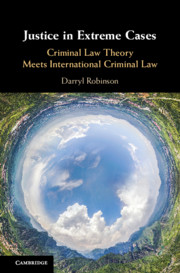Book contents
- Justice in Extreme Cases
- Justice in Extreme Cases
- Copyright page
- Contents
- Acknowledgements
- Cases, Statutes, and Other Authorities
- Abbreviations
- Part I Introduction and Problem
- Part II Proposed Solution: A Humanist, Coherentist, Deontic Account
- Part III Illustration through Application
- 6 An Unresolved Contradiction
- 7 The Outer Limits of Culpability
- 8 The Genius of Command Responsibility
- 9 Horizons: The Future of the Justice Conversation
- Book part
- Glossary of Selected Terms
- Bibliography
- Index
8 - The Genius of Command Responsibility
from Part III - Illustration through Application
Published online by Cambridge University Press: 17 December 2020
- Justice in Extreme Cases
- Justice in Extreme Cases
- Copyright page
- Contents
- Acknowledgements
- Cases, Statutes, and Other Authorities
- Abbreviations
- Part I Introduction and Problem
- Part II Proposed Solution: A Humanist, Coherentist, Deontic Account
- Part III Illustration through Application
- 6 An Unresolved Contradiction
- 7 The Outer Limits of Culpability
- 8 The Genius of Command Responsibility
- 9 Horizons: The Future of the Justice Conversation
- Book part
- Glossary of Selected Terms
- Bibliography
- Index
Summary
In this chapter, I examine a different controversy in command responsibility: the mental element. Scholars and jurists have raised powerful, principled objections to the modified fault standards in command responsibility, such as the ‘should have known’ standard in the ICC Statute. They are absolutely right to raise such questions, because a negligence standard in a mode of accessory liability seems to chafe against our normal analytical and normative constructs. However, I advance, in three steps, a culpability-based justification for command responsibility. I argue that the intuition of justice underlying the doctrine is sound.
I argue that the ‘should have known’ standard in the ICC Statute, rather than being shunned, should be embraced. I argue that the ‘should have known’ standard actually maps better onto personal culpability than the rival formulations developed by the Tribunals.
This chapter gives an example of the two-way conversation and illumination in the encounter between criminal law theory and ICL. This is an instance where ICL, by highlighting special contexts and problems, can lead us to reconsider some of our initial reactions and conclusions. Command responsibility delineates a set of circumstances where our normal reflexes about the lesser culpability of criminal negligence may be unsound.
- Type
- Chapter
- Information
- Justice in Extreme CasesCriminal Law Theory Meets International Criminal Law, pp. 194 - 223Publisher: Cambridge University PressPrint publication year: 2020

